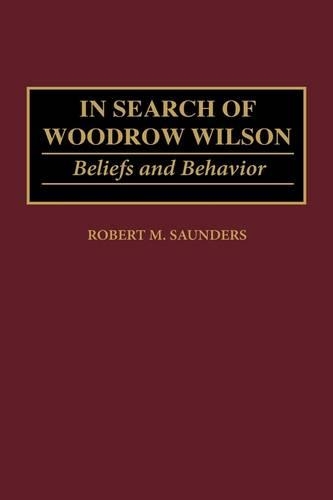
In Search of Woodrow Wilson: Beliefs and Behavior
(Hardback)
Publishing Details
In Search of Woodrow Wilson: Beliefs and Behavior
By (Author) Robert M. Saunders
Bloomsbury Publishing PLC
Praeger Publishers Inc
9th December 1998
United States
Classifications
Tertiary Education
Non Fiction
Biography: historical, political and military
History of the Americas
973.913092
Physical Properties
Hardback
288
Description
Saunders complements an understanding of the origins and evolution of Woodrow Wilson's beliefs, particularly the notion of stewardship, with an appreciation of the strengths and weaknesses of his leadership and the historical context within which he pursued his dreams. Based upon a thorough and systematic analysis of the available primary sources, this work explores Wilson's relationship with his parents, his wives, and his professional and political colleagues. It examines his conduct of domestic and foreign policy from 1913-1921, as well as his inner turmoil over professed beliefs which conflicted with the demands of leadership. This detailed account records the social background, beliefs, and behavior of one of America's most controversial and significant 20th century leaders. Woodrow Wilson is perceived as the epitome of the modern idealist who took the United States into World War I to make the world safe for democracy; however, this book will show that this view of Wilson is fraught with more than the usual distortions. With the end of the Cold War and the publication of the full body of Wilson's papers, it is now possible to examine Wilson in a new and more complete light. The tensions between Wilson's private ambitions and his public role refute the main stereotype of him as an idealist.
Reviews
In covering the Wilson presidency, Saunders asserts that Wilson the diplomat, who has frequently been portrayed as a moralist and ideologue, actually employed principles as a means to an end. Indeed, Wilson's call for war against Germany in 1917 was to ensure that the US would have a significant role in the peace talks at the end of the conflict and thus allow Wilson to seek an unchecked hegemonic global stewardship for the US based on its own prosperity and security....Sauders makes extensive use of the papers of Woodrow Wilson....Recommended for general readers, undergraduates, and graduate students.-Choice
It is not easy to reach new research-based conclusions about a person on whom there already exits a large body of knowledge, but Saunders has broken new ground.-Perspectives on Political Science
Saunders's study is unique...we get a satisfactory... overview of Wilson's "Beliefs and Behavior."-Canadian Journal of History/Annales canadiennes d'histories
"It is not easy to reach new research-based conclusions about a person on whom there already exits a large body of knowledge, but Saunders has broken new ground."-Perspectives on Political Science
"Saunders's study is unique...we get a satisfactory... overview of Wilson's "Beliefs and Behavior.""-Canadian Journal of History/Annales canadiennes d'histories
"In covering the Wilson presidency, Saunders asserts that Wilson the diplomat, who has frequently been portrayed as a moralist and ideologue, actually employed principles as a means to an end. Indeed, Wilson's call for war against Germany in 1917 was to ensure that the US would have a significant role in the peace talks at the end of the conflict and thus allow Wilson to seek an unchecked hegemonic global stewardship for the US based on its own prosperity and security....Sauders makes extensive use of the papers of Woodrow Wilson....Recommended for general readers, undergraduates, and graduate students."-Choice
Author Bio
ROBERT M. SAUNDERS is Professor of History at Christopher Newport University, Newport News, Virginia. He has been a Fulbright Teaching Scholar at the University of Singapore and a Visiting Professor at Charles University in the Czech Republic. He has published numerous articles on American History and the teaching of History.
